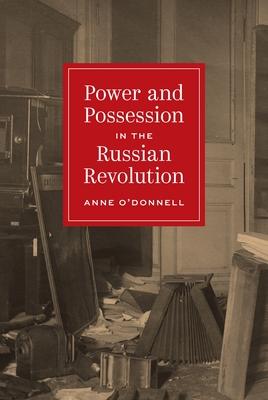A history that reframes the Bolsheviks' unprecedented attempts to abolish private property after the revolutions of 1917
The revolutions of 1917 swept away not only Russia's governing authority but also the property order on which it stood. The upheaval sparked waves of dispossession that rapidly moved beyond the seizure of factories and farms from industrialists and landowners, envisioned by Bolshevik revolutionaries, to penetrate the bedrock of social life: the spaces where people lived. In Power and Possession in the Russian Revolution, Anne O'Donnell reimagines the Bolsheviks' unprecedented effort to eradicate private property and to create a new political economy--socialism--to replace it. O'Donnell's account captures the story of property in reverse, showing how the bonds connecting people to their things were broken and how new ways of knowing things, valuing them, and possessing them coalesced amid the political ferment and economic disarray of the Revolution. O'Donnell reminds us that Russia's postrevolutionary confiscation of property, like many other episodes of mass dispossession in the twentieth century, largely escaped traditional forms of record keeping. She repairs this omission, drawing on sources that chronicle the lived experience of upheaval--popular petitions, apartment inspections, internal audits of revolutionary institutions, and records of the political police--to reconstruct an archive of dispossession. The result is an unusually intimate history of the Bolsheviks' attempts to conquer people and things. The Bolsheviks' reimagining of property not only changed peoples' lives and destinies, it formed the foundation of a new type of state--one that eschewed the defense of private property rights in favor of an enduring but enigmatic new domain: socialist state property.
A history that reframes the Bolsheviks' unprecedented attempts to abolish private property after the revolutions of 1917
The revolutions of 1917 swept away not only Russia's governing authority but also the property order on which it stood. The upheaval sparked waves of dispossession that rapidly moved beyond the seizure of factories and farms from industrialists and landowners, envisioned by Bolshevik revolutionaries, to penetrate the bedrock of social life: the spaces where people lived. In Power and Possession in the Russian Revolution, Anne O'Donnell reimagines the Bolsheviks' unprecedented effort to eradicate private property and to create a new political economy--socialism--to replace it. O'Donnell's account captures the story of property in reverse, showing how the bonds connecting people to their things were broken and how new ways of knowing things, valuing them, and possessing them coalesced amid the political ferment and economic disarray of the Revolution. O'Donnell reminds us that Russia's postrevolutionary confiscation of property, like many other episodes of mass dispossession in the twentieth century, largely escaped traditional forms of record keeping. She repairs this omission, drawing on sources that chronicle the lived experience of upheaval--popular petitions, apartment inspections, internal audits of revolutionary institutions, and records of the political police--to reconstruct an archive of dispossession. The result is an unusually intimate history of the Bolsheviks' attempts to conquer people and things. The Bolsheviks' reimagining of property not only changed peoples' lives and destinies, it formed the foundation of a new type of state--one that eschewed the defense of private property rights in favor of an enduring but enigmatic new domain: socialist state property.Hardcover
$44.39